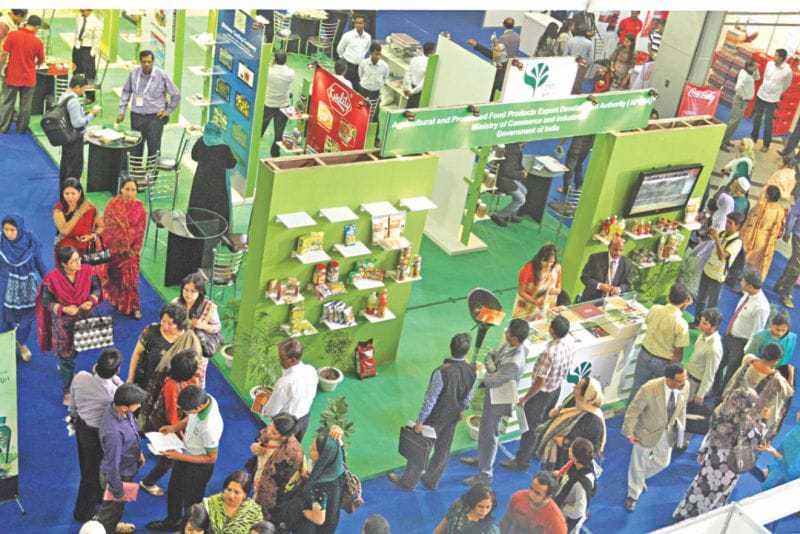India Show brightens investment prospects

A view of visitors to the first ever India Show being held at Bangabandhu International Conference Centre in Dhaka. Sixty Indian companies are showcasing products at the three-day fair that started yesterday.Photo: STAR
Top business leaders and government officials both from New Delhi and Dhaka yesterday called for more investment in Bangladesh from India and buying more goods and products from the country to narrow the trade gap.
They also emphasised removing non- and para-tariff barriers, improving infrastructure on borders, establishing railway and water links and setting up more border markets to facilitate trade.
Their calls came at the launch of the three-day India Show at Bangabandhu International Conference Centre in Dhaka.
The first-ever India Show themed 'Partnerships for Progress' in the capital aims to showcase the best of India in the 21st century and bring the business communities of both countries together.
The exhibition will feature a series of seminars, business to business interactions, product displays and include a public interface.
The Federation of Indian Chambers of Commerce and Industry (FICCI) has organised the show with the assistance of the Indian government and in partnership with the Federation of Bangladesh Chambers of Commerce and Industry (FBCCI) and India-Bangladesh Chamber of Commerce and Industry (IBCCI).
More than 60 Indian companies representing textile and handicrafts, automobile and spare parts, readymade garments, consumer products, jewellery, healthcare, education, information technology, agro-business and food processing, renewable energy, light engineering are exhibiting their products and services in over 100 stalls and pavilions.
FICCI President RV Kanoria said they hope the two-way formal trade between the two countries would reach $10 billion in two years from about $5 billion at present.
He said the figure would be much higher if informal trade, which is believed to have already crossed $10-billion mark, is taken into consideration. "The potential is much higher."
Indian businesspeople should invest in Bangladesh and take advantage of the facilities the country offers and then export the goods and products to the vast Indian market, said Kanoria, who is also the chairman and managing director of New Delhi-based Kanoria Chemicals and Industries Ltd.
He also called for improving trade-related infrastructure on both sides of the border.
Indian Commerce Secretary SR Rao said he hopes the India Show would lead to greater investment and open new vistas in the business opportunities.
The secretary said India is committed to reducing the trade imbalance with Bangladesh further. Bangladesh's exports to India increased ten-fold in the last one decade. "This shows the success of our policies, but a lot more still needs to be done from the India side not only deepening the integration, but also to make trade relations more equitable and sustainable, as our prime minister has suggested."
He said India has already given duty- and quota-free access to Bangladeshi products into its markets. "We hope Bangladesh's industries will make best use of this new opportunity as we want to see more exports from Bangladesh to India."
Rao said they are ready to open four more border markets on Tripura border.
He also said India also welcomes Bangladesh's investment in the country, which would make Bangladesh a regional hub.
Speaking as the chief guest, GM Quader, commerce minister, said the Bangladeshi government offers the most liberal trade regime in the world in setting up fully-owned or joint venture businesses.
"You can invest in the country as much as you want and take out your profit and investment whenever you want," he said.
Given the deficit in trade balance, India's decision of allowing duty- and quota-free market access to Bangladeshi products is a very good gesture from the Indian side to boost up trade between the two countries and encourage businesspeople to export more.
Bangladesh imported goods from India worth $5 billion and exported goods worth about $500 million in 2011-12. The trade balance between the two countries is heavily tilted towards India, said Kazi Akramuddin Ahamed, president of FBCCI.
"There is a need to reduce this trade gap by boosting imports from Bangladesh."
Although India has allowed the duty- and quota-free export facility, the country's businesspeople have failed to give a major boost to trade due to existing non-tariff and para-tariff barriers, said Ahamed, who is also the chairman of Standard Bank Ltd.
Pankaj Saran, Indian high commissioner, said the show is the testimony of the Indian business delegation's belief that Bangladesh has a huge growth potential and is poised to expand.
Abdul Matlub Ahmad, president of IBCCI, and A Didar Singh, secretary general of Ficci, were also present.

 For all latest news, follow The Daily Star's Google News channel.
For all latest news, follow The Daily Star's Google News channel. 



Comments